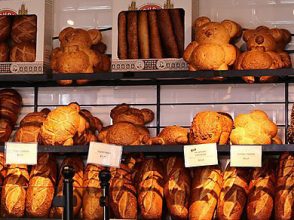Monk fruit comes from plants. People use products made from the extracts to sweeten foods and drinks.
Monk fruit which is a zero-calorie sweetener
Monk fruit is 150 to 200 times sweeter than sugar.
Monk fruit is also called luo han guo or swingle. It looks like a small gourd, and it grows on a vine.
monk fruit sugar foodchem
Monk fruit is native to regions of Southeast Asia, including some parts of Thailand and China. Buddhist monks in the 13th century were the first to cultivate the fruit, which is the reason for its name.
Fresh monk fruit spoils rather quickly. Traditionally, people used dried monk fruit in herbal medicines.
Today, monk fruit is most popular as a natural sweetener. The fruit's extract contains substances called mogrosides, which are intensely sweet.
According to the International Food Information Council Foundation, monk fruit is around 150–200 times sweeter than sugar. Some manufacturers mix the extract with different sugars to balance out the intensity.
A monk fruit sweetener has several benefits when compared with sugar:
1.Zero calories. Monk fruit extract contains no calories, which is helpful for people on diets that restrict a person's caloric intake.
2.Zero carbohydrates. The extract also contains no carbohydrates, which may make it ideal for people on low-carb or keto diets.
3.Zero sugar. There is no sugar in pure monk fruit extract, which means that consuming it will not affect blood sugar levels.
4.No harmful side effects. The U.S. Food and Drug Administration (FDA) considers monk fruit sweeteners to be generally regarded as safe. There appears to be no evidence that monk fruit sweeteners cause harmful side effects.
5.Available in multiple forms. Monk fruit sweeteners are marketed as granules, powders, and liquids. Some products may be easy to carry and use throughout the day.

Monk fruit sweeteners may also have some health benefits:
monk fruit sugar
1.Antioxidants. Some studies in animals suggest that mogrosides extracted from monk fruit may have potent antioxidant properties. Further research is needed to understand the effects on humans. Also, it is unclear if eating processed sweetener has the same benefits as eating the fruit.
Diabetes.
2. Research in animals also suggests that mogrosides play a role in controlling blood sugar levels.
- Results of another study indicate that mogroside extracts may help prevent diabetic complications. However, researchers have yet to investigate these effects in humans.
Monk fruit cons
For the following reasons, a person may think twice before using monk fruit sweeteners to replace sugar:
Availability and cost. Monk fruit is difficult to grow and costly to export, which means that it is not as widely available as other sweeteners, and it can be expensive.
Taste. Monk fruit sweeteners taste different from regular table sugar, and some find the taste unusual or unpleasant. The sweeteners can also leave an aftertaste.
Other ingredients. Some manufacturers balance the taste of monk fruit by mixing it with other sugars, such as maltodextrin or dextrose. This can change the sweetener's nutritional profile and make it unsafe or undesirable for some people.






![Hydrolyzed Vegetable Protein [HVP] - SavorPlus™](https://www.foodchem.com/wp-content/uploads/2020/03/hvp1-294x220.jpg)

